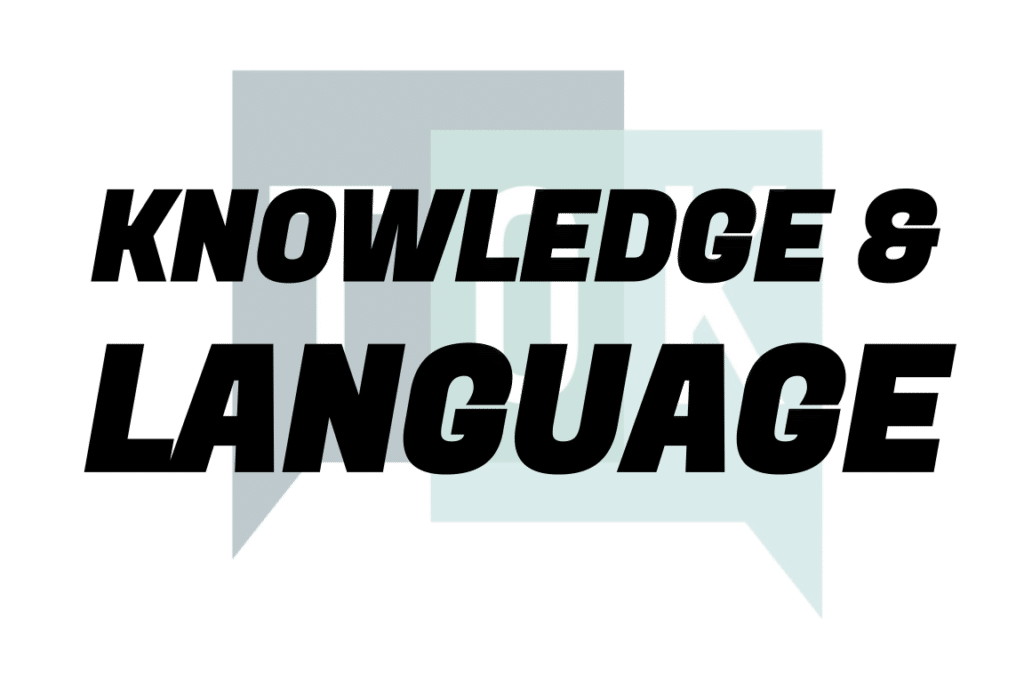
Welcome to the language section of the site. This page will help you to take ownership of language via a quick overview, and four padlets that offer you quotes, knowledge questions, real-world issues, and key thinkers relating to this optional theme.
You can use this content both to understand this component of TOK, and support discussions and arguments that you offer in your essay and exhibition.
Knowledge & language: a quick overview
The optional theme of knowledge & language explores the relationship between language and the acquisition, interpretation, and communication of knowledge. Language is the most significant medium through which we convey our thoughts, ideas, and experiences, making it a cornerstone of our cognitive development. As we navigate this theme, we encounter several key concepts.
Culture plays a pivotal role in understanding how language shapes and reflects the values, norms, and traditions of different societies. Interpretation becomes a central concept as we delve into the ways language can be a vehicle for conveying meaning and also a source of potential miscommunication. The notion of perspective highlights how individual and cultural viewpoints influence language and, consequently, our understanding of the world.
Two influential thinkers in the realm of language and knowledge are Noam Chomsky and Chimamanda Ngozi Adichie. Noam Chomsky, a renowned linguist and cognitive scientist, revolutionized our understanding of
language acquisition with his theory of Universal Grammar, proposing that all human languages share a common underlying structure. Chimamanda Ngozi Adichie, a Nigerian author, addresses the power of storytelling and language in shaping our perceptions and stereotypes, particularly in her famous TED Talk, “The Danger of a Single Story.”
Contemporary issues related to language and knowledge revolve around the impact of digital communication on language evolution and the potential loss of linguistic diversity. Additionally, discussions on linguistic discrimination and the marginalization of certain dialects and languages emphasize the social power dynamics intertwined with language use.
Engaging with the theme of knowledge & language invites students to explore the complexities of linguistic communication, embrace diverse perspectives, and critically examine the power and limitations of language in shaping our understanding of the world. It underscores the importance of linguistic diversity, cultural sensitivity, and ethical responsibility in the global exchange of ideas.
1 QUOTES Who said “The limits of my language are the limits of my world”?
Explore these quotes on language by a wide range of different thinkers. Which quotes are the most and least insightful? How they challenge our assumptions about language? What do they reveal about links between language and other aspects of the TOK course?
2 KNOWLEDGE QUESTIONS What is the relationship between words and meaning?
Identifying and exploring knowledge questions (KQs) is at the heart of TOK, prompting us to reflect on our knowledge, evaluate whether it’s be based on a flawed or incomplete assumptions, and provide us with a focus point to improve our understanding of the world.
3 REAL-WORLD ISSUES How is language a “constantly shifting terrain”?
These examples will help you to understand how TOK ideas manifest in the real-world, take ownership of language, link TOK to the latest global issues, and become an authentic critical thinker. They will also help you to justify and explore the discussions you offer in your essay and exhibition.
4 KEY THINKERS Is Kory Stamper a descriptivist, or a prescriptivist?
The thinkers in this padlet will help you to consolidate your understanding of language, and challenge your assumptions about the world. You can also draw on their ideas to support your essay and exhibition discussions, and add depth and authority to the claims you make about knowledge.
LANGUAGE: DEEPER DIVES Follow these links to access a range of notes, essays, and observations.

Subscribe to the free TOK newsletter!
Subscribe to our free newsletter, and collect fantastic examples to help you understand the key TOK ideas, support your essay and exhibition, and make you an authentic critical thinker.
You’ll encounter some of the most important thinkers from the past and the present, go beyond the headlines of contemporary events and issues around the globe, and see how TOK concepts manifest in the real-world. Subscribe HERE!